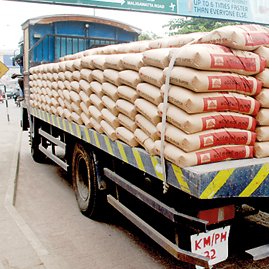
Iran Dismisses Pakistan’s Cement Dumping Allegation

“The local market in areas adjacent to the Iranian border and the coastal area of Balochistan are flooded with Iranian cement. Domestically produced cement is losing its markets, as it is unable to compete with Iranian offerings due to their duty and tax evasions,” PCMA’s Chairman Mohammad Ali Taba was quoted as saying by the Pakistani daily The Nation.
Iranian producers, however, staunchly dismiss any dumping allegations.
“Accusing Iranian exporters of dumping is old news,” says the head of Cement Employers Association, Abdolreza Sheikhan. “Pakistani producers, who have higher energy costs, pressure their government every once in a while to expand their market reach.”
According to Sheikhan, Iranian cement is primarily exported to Quetta, the provincial capital of Balochistan and the closest Pakistani market to the Iranian border.
The city has no cement production and needs to import the industrial material, which consequently leads consumers to choose between Iranian offerings from just across the border, or local cement produced in that country’s northern provinces.
Pakistani producers’ high transportation costs render Iranians the more competitive and economic choice.
“Iranian cement is shipped at its finished price and not any lower,” said Sheikhan, adding that the volume of Iranian shipments to Quetta is “insignificant”, which does not constitute dumping.
According to IRNA, Pakistan imports about 600 tons of Iranian cement every day.
Dumping is the export by a country or company of a product at a price that is lower in the foreign market than the price charged in the domestic market. As dumping usually involves substantial export volumes, it often has the effect of endangering the financial viability of manufacturers or producers of the product in the importing nation.
Trade dumping can be identified by simply comparing the sales price of a good in its market of origin and the price listed in an importing market. It is considered intentional in nature in that the primary purpose is to gain an advantage within the market that imports the goods.
Mohammad Reza Ehsanfar, managing director of Zabol Cement Company, believes that what is perceived as dumping by other countries is in fact an unhealthy competition among Iranian producers due to a widespread lack of liquidity.
Engaging in dumping requires the government to subsidize the industry to make up for the lower prices and reap the benefits in the long run. The Iranian cement industry, however, is currently in the doldrums. And the government, too, is unable to help the sector.
What ensues is that producers, hunting for new markets due to depressed local demand, rush to export destinations and try to cut out competitors by slashing production and transportation costs. This competition ensnares everyone in a quagmire and shrinks profitability.
“From the outside, this looks like attempting dumping,” Ehsanfar said.
Iran is currently the world’s seventh largest cement producer as it dropped three steps last year due to its plummeting production. Production reached 58.6 million tons in 2015, down 12% year-on-year, according to CEA data.
Iranian cement plants’ 80-million-ton annual manufacturing capacity exceeds domestic demand by more than 30 million, according to data released by Planning and Budget Organization. This is while the Ministry of Industries, Mining and Trade has set the target of 60% growth for domestic cement output over the next decade to reach 120 million tons.
Exports are also envisioned to rise 68% to reach 32 million tons.
More than 15 million tons of cement and clinker were exported in the last Iranian year (ended March 19, 2016), with Iraq accounting for close to 65% of the figure.
Exports dropped markedly in April after the Iraqi government imposed a ban on cement imports.


Trump weighs using $2 billion in CHIPS Act funding for critical minerals

Codelco cuts 2025 copper forecast after El Teniente mine collapse

Electra converts debt, launches $30M raise to jumpstart stalled cobalt refinery

Barrick’s Reko Diq in line for $410M ADB backing

Abcourt readies Sleeping Giant mill to pour first gold since 2014

Nevada army depot to serve as base for first US strategic minerals stockpile

SQM boosts lithium supply plans as prices flick higher

Viridis unveils 200Mt initial reserve for Brazil rare earth project

Tailings could meet much of US critical mineral demand – study

Kyrgyzstan kicks off underground gold mining at Kumtor

Kyrgyzstan kicks off underground gold mining at Kumtor

KoBold Metals granted lithium exploration rights in Congo

Freeport Indonesia to wrap up Gresik plant repairs by early September

Energy Fuels soars on Vulcan Elements partnership

Northern Dynasty sticks to proposal in battle to lift Pebble mine veto

Giustra-backed mining firm teams up with informal miners in Colombia

Critical Metals signs agreement to supply rare earth to US government-funded facility

China extends rare earth controls to imported material

Galan Lithium proceeds with $13M financing for Argentina project

Kyrgyzstan kicks off underground gold mining at Kumtor

Freeport Indonesia to wrap up Gresik plant repairs by early September

Energy Fuels soars on Vulcan Elements partnership

Northern Dynasty sticks to proposal in battle to lift Pebble mine veto

Giustra-backed mining firm teams up with informal miners in Colombia

Critical Metals signs agreement to supply rare earth to US government-funded facility

China extends rare earth controls to imported material

Galan Lithium proceeds with $13M financing for Argentina project

Silver price touches $39 as market weighs rate cut outlook

















